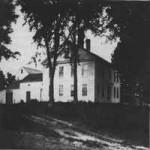Getting Organized

The Pejebscot Proprietors held a meeting in Boston in 1765. In 1766 Jonathan Bagley and Moses Little were appointed a committee to lay out a road and build a log house for the settlement; the proprietors often made such improvements to persuade settlers to purchase lots. The proprietors met again in 1767, establishing a plantation to be named Royalsborough and to be surveyed into 96 lots.
The earliest settler was Samuel Gerrish (Gerrish’s Mill), about 1769. About the same time Judah Chandler built a sawmill. Other early settlers were John Cushing, Isaac Bagley and Ebenezer Newell. Each cleared a homelot, burning the trees and using the ashes to nourish his first plantings. Primitive logging roads were carved out of the forests to get logs to coastal towns. Trails or rough roads were laid out to Harriseeket (Freeport), to what became Auburn to the north, and west to North Yarmouth and Falmouth.
In 1768 the proprietors appointed Jonathan Bagley, Moses Little and Belcher Noyes as a committee to attract settlers. The first 10 deeds were granted in 1770; by 1776, 25 settlers were occupying their own lots.
The tiny plantation furnished its share of men to the Revolution. A Committee of Correspondence maintained links with others and raised money for bounties and aid to soldiers’ families. Enrolled from Royalsborough were 19 men; 34 other veterans lived here after their service.
At several meetings the settlers discussed “Some Method for Entering into some order in Said Town.” Although proposals to become a town were made in 1782 and 1783, the group voted against it in 1784 and 1786. Then, in a petition to the Massachusetts General Court on February 4, 1788 that described at length the privations suffered during the war, the settlers asked forgiveness for back taxes and for incorporation into a town named Sharon “that we may be in a capacity of enjoying those civil and religious privileges which other towns enjoy, which if rightly improved will make us a happy people.” The General Court on February 17, 1789 voted to establish a town named Durham. It often happened that names would thus be arbitrarily chosen. At that time the town had about 70 families and claimed 700 people.
Durham held its first Town Meeting on March 17, 1789, and began its struggles to bring in the benefits of civilization like roads, schools and industry. Like most Maine towns, there was trouble between the proprietors and the many squatters, who declared that the land belonged to those who improved it. This was also largely a dispute between the wealthy Federalists and Army generals, and the soldiers who had fought for liberty. The General Court in 1798 passed the Betterment Act, requiring the owners to sell to the squatters at a low price or to repay them for their improvements—clearing land, building homes and making log roads. About 40 settlers then purchased their deeds for about one dollar per acre.

